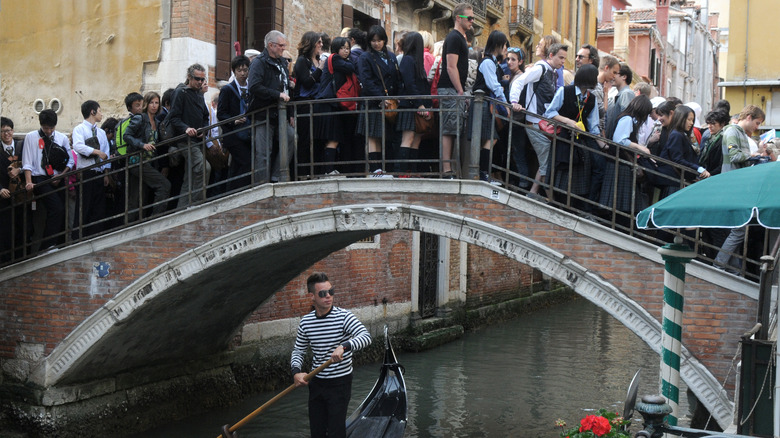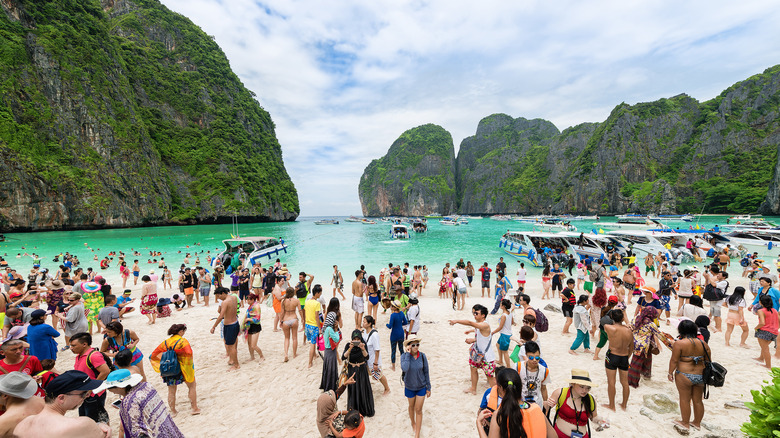Travel Guides International Travel Etiquette
Matt Berry
“Overtourism” is a term that’s making a lot of headlines lately. Over the last few years, some popular destinations began pushing back against tourism, bringing to light the detrimental effects that overtourism can create. In places like Rome, Amsterdam, and Venice, officials introduced new measures to deter tourist overload and irresponsible tourist behavior.
Amsterdam banned Red Light District tours, Paris has tried to stop tour buses from operating in its city center, and Venice imposed an entrance fee on day-tripping tourists. From Thailand to Machu Picchu, local officials have implemented similar measures.
While responsibly managed tourism creates jobs and generates wealth, the issues involved with overtourism can be both detrimental and lasting. Overtourism pollutes natural environments, raises housing and land prices, and prices out local residents.
Overall, tourism devolves into overtourism when crowds — and the lack of infrastructure required to accommodate these crowds — degrade the quality and livability of a particular place. However, you can avoid contributing to overtourism in several ways, helping to ensure locals, other tourists, and future generations continue to enjoy popular destinations.
Follow local rules and be respectful

Overtourism is a bit difficult to approach without feeling a little hypocritical. It’s like sitting in traffic complaining about the traffic. You’re part of the traffic! However, understanding you’re a tourist is the first step in addressing overtourism. You’re a short-term visitor, so leaving the smallest footprint possible is important.
Of course, don’t litter, and respect all urban and natural environments. This may mean staying on designated trails, following local rules, and staying mindful of private property. Many popular destinations are making strides to mitigate the tide of tourism. By simply following local rules, you’re also helping. If hiring a guide, do your research to ensure the tour company is also committed to ethical, responsible practices.
Along with the sheer crush of tourist numbers, irresponsible tourist behavior also contributes to the notion of overtourism. You’re simply a visitor to someone else’s home, so don’t be a nuisance. Be respectful of residents living their daily lives. Share the sidewalk, be courteous, and don’t act like a jackass. It really isn’t difficult.
Eat, sleep, and shop local

Avatar_023/Shutterstock
In addition to being courteous to residents, support the community by buying strictly local. While tourism can benefit local businesses, you’ll often need to find them. Too often, large tour groups spend little money and less time within the actual community. They follow a very patterned itinerary that may benefit a few businesses while dismissing others. (It’s typically a pay-to-play scenario that you should avoid.) Explore to find smaller, locally owned restaurants and shops instead of the touristy establishments that tend to cause local businesses to shutter.
Similarly, try to book local accommodations. While it’s tempting to stay at a short-term rental or chain hotel, these types of accommodations raise rent and real estate prices, which can price out residents. Sleeping, eating, and shopping locally help to support the communities welcoming you. Not to mention, you’ll have a more culturally immersive experience.
While tourism is a delicate balance, a little mindfulness can help to minimize your tourist footprint. By acting responsibly, spending responsibly, and traveling responsibly, you can avoid contributing to the problem of overtourism. Residents and future generations will thank you, and as tourists ourselves, so do we.

